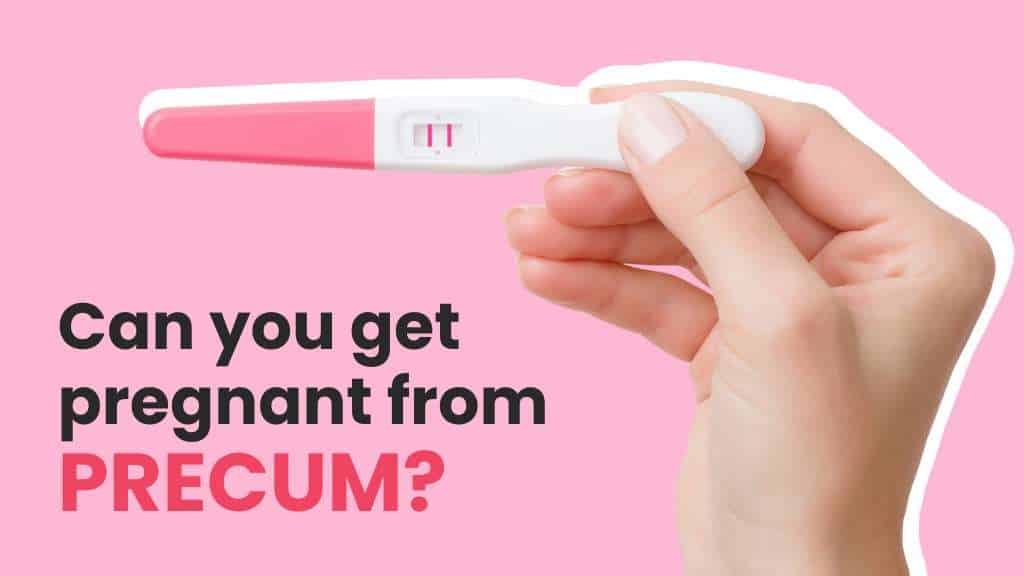
Introduction
The topic of pregnancy is often surrounded by a myriad of misconceptions and myths. One of the most common questions people have is whether can you get pregnant from precum, also known as pre-ejaculate. Precum is a clear fluid that is released from the penis during sexual arousal.
In this blog, we will explore the scientific facts and evidence surrounding the potential that can precum get you pregnant. By the end, you will have a clearer understanding of the risks involved and the importance of contraception in preventing unintended pregnancies.
Understanding precum
Before delving into the question can you get pregnant from precum, it’s important to understand the nature and function of precum itself. Precum is a clear lubricating fluid that is produced by the Cowper’s glands located at the base of the penis. Its purpose is to neutralize any residual acidity in the urethra and provide lubrication for smoother sexual intercourse. However, it is essential to note that precum does not contain sperm by default. Its composition is primarily alkaline, consisting of enzymes, amino acids, and electrolytes.
Sperm in precum: the gray area
While precum does not typically contain sperm, there is a possibility of sperm being present in it under certain circumstances. It is crucial to recognize that residual sperm from a previous ejaculation can remain in the urethra. If a man has ejaculated recently, there is a chance that some sperm may still be present in the precum. However, the concentration of sperm in precum is significantly lower compared to full ejaculation.
Factors affecting the presence of sperm in precum
Several factors contribute to the presence or absence of sperm in the precum. These factors include:
1. Urinating: Urinating after the last ejaculation flushes out any remaining sperm from the urethra, reducing the chances of sperm being present in the precum.
2. Time since last ejaculation: The longer the time gap between ejaculations, the less likely it is for sperm to be present in precum.
3. Sexual arousal: Increased sexual arousal can stimulate the release of precum, potentially flushing out any residual sperm from the urethra.
Pregnancy risks and precautions
While the chances of pregnancy from precum are relatively low, it is essential to understand that pregnancy can still occur. Factors such as timing, fertility, and contraception play significant roles. Here are a few key points to consider:
1. Timing: Pregnancy can occur if sexual intercourse takes place during the fertile window, which typically spans a few days before ovulation and the day of ovulation.
2. Fertility: Each person’s fertility varies, and some individuals have higher fertility rates, increasing the risk of pregnancy even with precum.
3. Contraception: If pregnancy prevention is a concern, it is crucial to use effective contraception methods consistently and correctly. Options include hormonal contraceptives, barrier methods, and intrauterine devices.
The importance of contraception
To prevent unintended pregnancies, the use of reliable contraception is vital. It is recommended to consult with healthcare professionals to determine the most suitable method based on individual circumstances and needs. Here are a few commonly used methods:
- Barrier methods: These include condoms (male and female) and diaphragms, which prevent sperm from reaching the egg.
- Hormonal methods: These include birth control pills, patches, injections, and implants, which work by regulating hormones to prevent ovulation or create a hostile environment for sperm.
- Intrauterine devices (IUDs): These small, T-shaped devices are inserted into the uterus and provide long-term contraception by preventing implantation or affecting sperm motility.
Is the Pull-out Method a Reliable Form of Contraception?
In comparison to certain other birth control techniques, the pull-out method exhibits a lesser degree of efficacy. According to information from the Centers for Disease Control and Prevention (CDC), the pull-out method carries an estimated failure rate of approximately 22%. This signifies that, within the span of a year, around 22% of individuals engaging in sexual activity who solely rely on the pull-out method may potentially face the prospect of pregnancy.
Some individuals opt for this approach for several compelling reasons:
- Cost-Efficiency: It comes at no financial expense.
- No Advance Preparation: This necessitates neither advance planning nor a visit to a healthcare facility or store.
- Hormone-Free: It does not involve any hormonal alterations.
- Prescription-Free: It does not require a medical prescription.
It is of paramount importance to recognize that no birth control method can claim to be infallible. For example, with typical usage, 18% of women who rely primarily on male condoms for contraception may encounter pregnancy within a year.
The statistical information provided here is grounded in data sourced from the aforementioned reference, which predominantly employs the term “women” in its population descriptors.
In the course of a year, 21% of women may conceive while relying solely on female (internal) condoms, and 28% may face pregnancy when exclusively using spermicide.
However, the likelihood of pregnancy diminishes significantly when individuals consistently and correctly employ birth control methods.
These statistics suggest that when used consistently and correctly every time, the pull-out method is approximately as effective as condoms. In this scenario, it even surpasses the efficacy of relying solely on spermicides. Furthermore, the pull-out method proves more effective than using no form of contraception, which results in pregnancy for 85% of women within one year.
Nevertheless, when juxtaposed with certain alternative contraceptive methods, the pull-out method exhibits a reduced level of effectiveness. For instance, 8% of women who depend on birth control pills may become pregnant within one year, while the corresponding figure stands at 12% for those who employ diaphragms.
Less than 1% of women utilizing intrauterine devices (IUDs) or implantable rods experience pregnancy within one year. Among women relying on injected contraceptives, such as depot medroxyprogesterone acetate (Depo-Provera), the likelihood of pregnancy during this timeframe is approximately 6%. This probability drops to a mere 0.15% when the male partner has undergone sterilization.
Key Considerations Regarding the Pull-Out Method:
- Difficulty of Practice: Executing it correctly may not be straightforward and is ideally complemented by condom usage.
- Ejaculation Control: Some individuals may struggle with controlling ejaculation or may not accurately discern its timing.
- STI Protection: It does not safeguard against sexually transmitted infections.
- Menstrual Cycle Tracking: Its efficacy can be improved by tracking the menstrual cycle and abstaining from intercourse during ovulation.
- Backup Plan: It is advisable to have a contingency plan or access to emergency contraception.
Before relying solely on the pull-out method, open and effective communication is of paramount importance. In cases of doubt concerning its reliability, considering an alternative form of birth control is prudent. Certain individuals opt for a combination of condoms and the pull-out method to further mitigate risk, preventing any viable sperm, including pre-ejaculate, from entering the vagina and providing a safety net in the event of condom failure.
Having explored the pull-out method, let’s now delve into the probability of pregnancy associated with pre-ejaculation.
After discussing the pull-out method, let’s look at what are the chances of getting pregnant from precum.
What are the Chances of Getting Pregnant from Precum?
The chances of precum-causing pregnancy are generally low, but it is not entirely impossible. The presence of sperm in the precum can occur in certain situations, such as when there is residual sperm in the urethra from a previous ejaculation. However, the concentration of sperm in precum is typically much lower compared to full ejaculation.
Several factors influence the likelihood of pregnancy from precum, including timing, fertility, and the use of contraception. Here are some important points to consider:
- Timing: Pregnancy can only occur if sexual intercourse takes place during the fertile window, which includes a few days before ovulation and the day of ovulation. If sexual activity occurs outside this window, the chances of pregnancy are significantly reduced.
- Fertility: Each person’s fertility varies, and some individuals may have higher fertility rates, increasing the risk of pregnancy even with precum. Factors such as age, overall health, and reproductive health can affect fertility.
- Contraception: The use of reliable contraception significantly reduces the risk of pregnancy from precum. Using effective contraceptive methods consistently and correctly provides an additional layer of protection. Options include hormonal contraceptives, barrier methods (e.g., condoms), and intrauterine devices (IUDs).
It is important to note that there is limited scientific research specifically focused on the pregnancy risk associated with precum. Most studies have focused on the presence of living sperm in precum rather than the actual likelihood of pregnancy. Therefore, it is challenging to provide precise statistics on how often precum can cause pregnancy.
To minimize the risk of unintended pregnancy, it is advisable to use contraception consistently and correctly, regardless of the presence of precum. If you have concerns or questions on whether can you get pregnant from precum, it is recommended to consult with a healthcare professional who can provide personalized guidance and advice based on your specific circumstances.
You may also read : Getting Pregnant With Irregular Periods
Conclusion - What are the Chances of Getting Pregnant from Precum?
The question of whether can you get pregnant from precum is one that often leads to confusion and misunderstanding. While precum itself does not typically contain sperm, it is possible for some sperm to be present under specific circumstances. However, the chances of pregnancy from precum alone are relatively low.
Nevertheless, it is essential to remember that any sexual activity carries a risk of pregnancy. To avoid unintended pregnancies, it is crucial to use reliable contraception consistently and correctly. If you have concerns or questions about pregnancy prevention, it is best to consult with a healthcare professional who can provide personalized advice and guidance.










